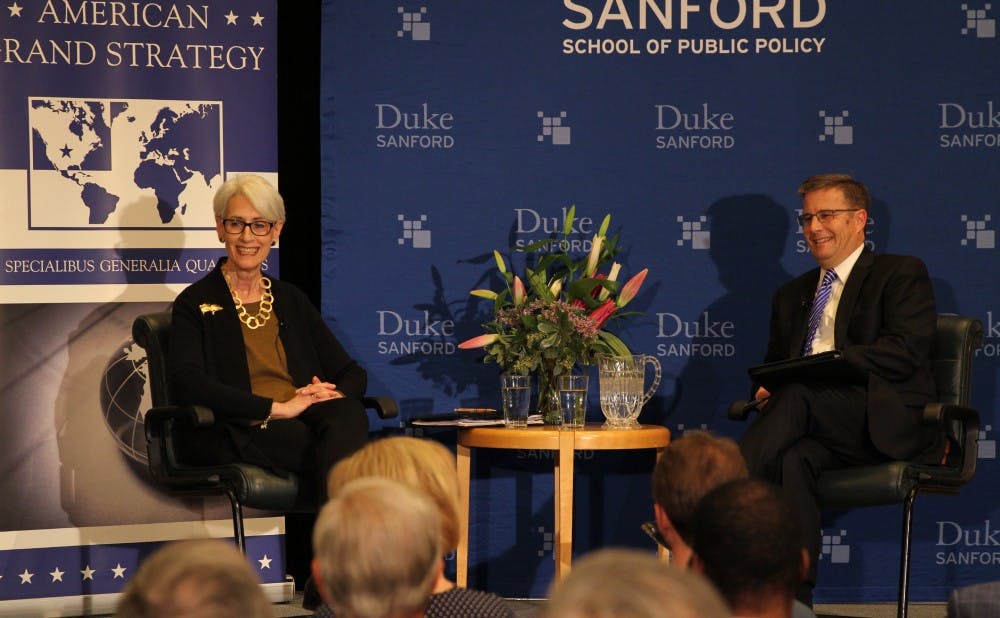The lead U.S. negotiator of the Iran nuclear deal provided insights about her adversaries during the negotiations at a public lecture Thursday.
Ambassador Wendy Sherman, former under secretary of state for political affairs for the U.S. Department of State, spoke at the Sanford School of Public Policy Thursday night about her experience negotiating the deal. During the talk, titled “Negotiating Change: The Inside Story Behind the Iran Nuclear Deal—A Conversation with Ambassador Wendy Sherman,” Sherman explored the negotiations from her perspective.
Peter Feaver, professor of political science and public policy and the director of Duke's American Grand Strategy program, interviewed Sherman about the conditions that led to the deal, as well as the challenges of handling the Iranian negotiators.
“Iran, not the Iranian government, loves the American people,” Sherman said. “[The Iranian government] uses enmity towards the U.S. to support the supreme leader and their approach to life."
In an interview with The Chronicle before the Ambassador Dave and Kay Phillips Family International Lecture, Feaver said that Sherman had a unique perspective because she was able speak face-to-face with Iranian diplomats for so long. He added that since U.S. laws and policies prevented American diplomats from meeting their Iranian counterparts, Sherman had more contact with the Iranian representatives than almost any other American diplomat.
Sherman stressed that two years of sanctions did not stop Iran's nuclear program, but that the election of President Hassan Rouhani is what finally brought Iran to the negotiating table.
“There are hardliners in Iran, and then there are hard-hardliners in Iran," she explained. "Rouhani is not a moderate, he is a hardliner."
Although he is considered moderate in Iran, Rouhani was willing to talk to the U.S. and open a secret line of communication to begin negotiations, Sherman explained.
Sherman also elaborated on her experiences working with the Iranian diplomats, saying that they were "tough, smart, and legalistic negotiators" and emphasizing that the negotiations were not about building trust, but rather about monitoring Iran’s nuclear program. The mistrust between the two countries is deep-seated, she explained, and can be traced back to the United States' involvement in the 1953 coup d’état of the Iranian prime minister.
Despite doubts about whether President Barack Obama and the U.S. would have been willing to resort to military options, Sherman said she wholeheartedly believes Obama would have used military force if necessary.
“Diplomacy backed up by the potential for military force is a very powerful tool,” Sherman said in an interview with The Chronicle before the lecture, adding that she thinks the Iran deal was the best alternative to military action that was on the table. “I hope that the Iran deal will mean that young people like yourself won’t have to go to war to stop Iran from doing terrible things."
After the talk, freshman Emile Riachi pointed out that the most interesting part for him was Sherman’s description of the Iranian and American mentalities during the negotiations.
“She really brought insights that I wouldn’t find in the press," Riachi said.
Get The Chronicle straight to your inbox
Sign up for our weekly newsletter. Cancel at any time.

